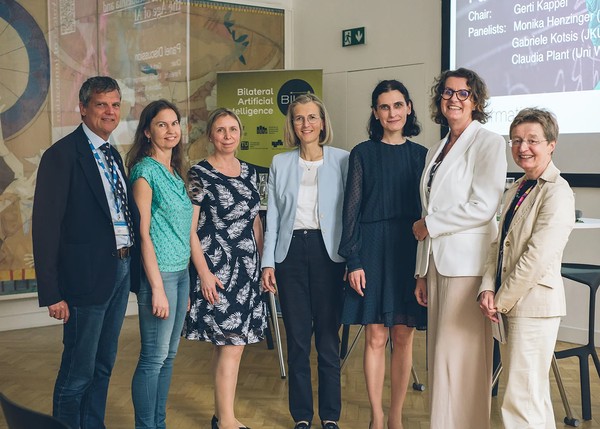Voices of Innovation: Women, Academia, and the Age of AI
TU Wien Informatics brought together leading female computer scientists to share their experiences, challenges, and insights as researchers in academia. The event reflected TU Wien’s ongoing commitment to diversity and innovation, reinforcing the university’s role in fostering creativity, advancing urban technologies, and driving responsible AI research.
Laura Kovács joined Monika Henzinger (Institute of Science and Technology Austria), Gabriele Kotsis (Johannes Kepler University Linz), Claudia Plant (University of Vienna), and Marta Sabou (Vienna University of Economics and Business) for a high-level discussion on advancing gender equity in computer science. The panel was moderated by TU Wien Informatics Dean Gerti Kappel, who emphasized the exceptional contributions of Austrian female computer scientists and the continued need to promote gender equality in science and research.
The discussion focused on key challenges and strategies throughout academic careers, including mentorship, dual-career dynamics, flexible career pathways, and early encouragement of girls’ interest in STEM. Panelists highlighted critical career stages—particularly postdoctoral transitions and maternity leave—where many women encounter systemic obstacles. They advocated for structured mentoring programs, family-friendly institutional policies, and supportive frameworks such as tenure-track positions and improved childcare options.
A central theme was the “leaky pipeline” in academia, where talented women leave research due to structural barriers. The panel stressed the importance of proactive, inclusive measures to help women thrive and lead in academic and scientific environments.
Encouragingly, panelists observed a positive trajectory in gender equity, with increasing awareness and improved representation in committees, awards, and leadership roles. The conversation concluded on an optimistic note, envisioning a future in which AI and other transformative technologies are shaped by diverse voices and equitable participation. The importance of visible female role models was recognized as essential for inspiring future generations of scientists and driving lasting cultural change in research.
© Amélie Chapalain / TU Wien Informatics
